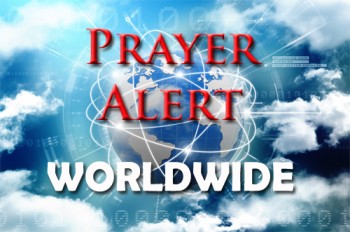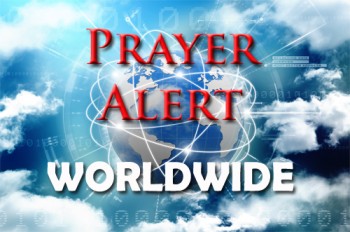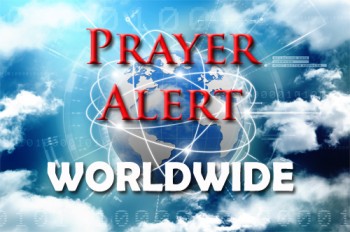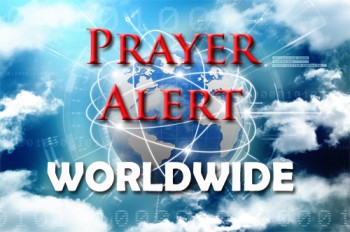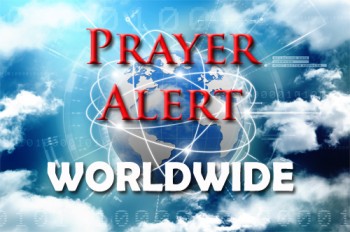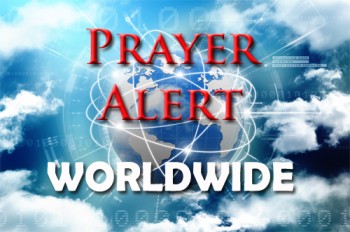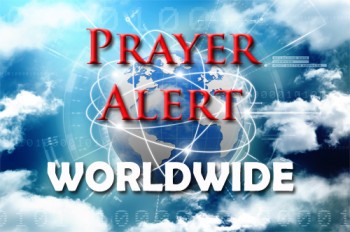Displaying items by tag: Middle East
Israel: US reopening consulate a 'bad idea'
Israel’s foreign minister, Yair Lapid, has called the Biden administration’s plan to reopen the US consulate in Jerusalem a ‘bad idea’ that could ‘destabilize’ Israel’s new government. He said it would send the wrong message not only to the region or to the Palestinians, but also to other countries, adding, ‘We don’t want this to happen’. His comments come after Biden reportedly discussed the issue with Israel’s ultraconservative prime minister, Naftali Bennett, last week at the White House. The Times of Israel cited unnamed officials as saying the Biden administration agreed to wait to open the consulate until after Bennett’s fragile new government passes a budget in November.
Lebanese pastor spiritually warned
Pastor Said Deeb, in Beirut, had a strange feeling on the day of the explosion. ‘ I felt something bad was going to happen,’ Deeb explained, ‘as if the Holy Spirit was saying, “Go! Go! Go!”’ He was uneasy, sent 34 staff home, and cancelled Bible classes for 200 children. ‘They thought I had lost my mind, but it was the Holy Spirit's prompting’, he explained. Then the unthinkable happened - 200+ people dead, 7,000 injured, and 300,000 made homeless. ‘I thought this was the end, but the Lord had another plan. Despite the horror of Beirut’s deadly explosion, God is bringing something good from the ashes. I'm seeing people come to Jesus like never before, never! - and a big number of priests coming to deeper faith, priests coming for the baptism of the Holy Spirit with the signs and wonders following. So it's the time for Lebanon.’
Iran / Israel: rockets and threats
19 rockets fired by Hezbollah into northern Israel on 7 August sent local residents into the towns’ shelters. These barrages, the first since the 2006 second Lebanon War, followed similar attacks the previous day. More provocations from Tehran by the new hard-line leader, Ebrahim Raisi, and his proxies increase the likelihood of Israel’s retaliation. The defence minister recently indicated that Israel is ready to counter Iran's aggression. The UN peacekeeping mission in Lebanon said the situation is ‘very serious’ and urged everyone to cease fire. But on 11 August rockets were fired again from Lebanon into Israel, which increases the threat of major hostilities after fifteen years. Pray for an end to these ongoing games of brinkmanship so that harmony between Israel and Hezbollah holds. May the prospect of full-scale war be a disincentive for either side to push too far.
Gulf of Oman: two tankers attacked in one week
The Asphalt Princess tanker was hijacked and boarded by nine armed men and ordered to sail to Iran through the congested approach to the Strait of Hormuz. Israel's prime minister Naftali Bennett said there was ‘evidence’ that its long standing foe Iran was responsible. Iran's Revolutionary Guards dismissed the reports as a pretext for ‘hostile action’ against Tehran. The tanker is owned by a Dubai-based company that had one of its ships hijacked two years ago by the revolutionary guards. The following day the hijackers left the tanker. A week earlier the Israeli-owned Mercer Street was attacked by a drone, killing two security guards. The US, UK and Israel blamed Iran for the attack - a claim it strongly denies. These attacks appear to be the latest escalation in an undeclared ‘shadow war’ between Israel and Iran. For months there have been several attacks on both Israeli- and Iranian-operated vessels, which are seen as tit-for-tat incidents. See
Lebanon: Beirut marches and Israeli attack
Israeli fighter jets have launched air raids on neighbouring Lebanon following a second day of rocket fire from Lebanon into Israeli territory. Fighter jets struck the launch sites and infrastructure from which the rockets were launched. Israeli aircraft routinely target Palestinian armed groups in Gaza and suspected Hezbollah or Iranian targets in Syria, but this was the first time since 2014 that they had hit targets in Lebanon. Previous acknowledged military actions mostly involved artillery shelling. Israel fought a 2006 war against Iran-backed Hezbollah, which is the dominant force in southern Lebanon. The border has been mostly quiet since then. The escalation came as thousands of grief-stricken Lebanese took part in a protest march on the first anniversary of a devastating explosion in Beirut that killed over 200. Lebanon’s situation has worsened since then - economic crisis, poverty, increasing, Covid, no hospital beds, no medicine, no electricity, no fuel - people feel that the government has forgotten they exist.
Jordan: pray for the unreached
Most of Jordan's population have not heard a good gospel message. Ways of changing this include literature, media ministry, friendship evangelism, development programmes, home meetings and camps. Pray for a sensitive witness to Muslims and protection of converts amid persecution. Pray also that the growing number of Muslim-background believers have the legal right to convert from Islam. Palestinians are a majority in Jordan. Many are second- or third- generation residents after leaving their traditional homeland. Some integrate into Jordanian life; others suffer from disillusionment, bitterness, and frustration which only the Man of Calvary can heal. Due to the Gulf Wars a million Iraqis also fled to Jordan. Years later, nearly half of these are unable or unwilling to return home. Christian work among them produces a good response. Jordanian churches have effective and widespread ministry to these refugees but need to be granted permission to educate them.
Palestinian human rights violations
The USA is resuming unconditional financial aid to the Palestinians without any stipulation that the PA end human rights violations and assaults on public freedoms. Lawyers for Justice said that the forms of torture in the PA-controlled Jericho Prison included hanging detainees from the ceilings, beatings, verbal abuse and electric shocks. ‘The Future List calls on all electoral lists approved by the Central Elections Committee, all human rights bodies and all honourable people of this country to form a united front to confront the arbitrary political arrests that aim to silence every free voice that rises in the face of tyranny and corruption practiced by the Palestinian Authority.’ It appears the diplomats care little that the PA is arresting, torturing and intimidating social media users and political activists. Western journalists loudly raise their voices when damning Israel. International silence and absolute support for the PA encourages Palestinian leadership to continue their repression.
Israel: Elections / Ceasefire under threat
Psalm 122:6 tells us to pray for the peace of Jerusalem. Currently Israel is undergoing significant upheaval whilst still facing threats from Palestinians in Gaza.
Having seen 11 days of relative peace following a ceasefire agreed between Israeli and Palestinian forces, the Israeli military confirmed an aircraft attack in the Gaza Strip on Wednesday 16th June, retaliating against incendiary balloons deployed by Hamas.
The attack comes barely two days after the ousting of Israel's former Prime Minister Benjamin Netanyahu. The attack reportedly targeted Hamas armed compounds in response to incendiary balloons that were deployed from the area. The balloons caused 10 fires in fields of southern Israel, Reuters reported.
 An unwieldy coalition calling itself “Change” has removed Benjamin Netanyahu, Israel’s longest-serving prime minister, after his most recent 12-year run. The eight-party coalition ranges from ultra-right religious nationalists to the secular hard-right, through the centre-right and residue of Israel’s left, to ally for the first time with an Arab Islamist party.
An unwieldy coalition calling itself “Change” has removed Benjamin Netanyahu, Israel’s longest-serving prime minister, after his most recent 12-year run. The eight-party coalition ranges from ultra-right religious nationalists to the secular hard-right, through the centre-right and residue of Israel’s left, to ally for the first time with an Arab Islamist party.
The new government will be led initially by Naftali Bennett, a champion of Jewish settlement. He is opposed to any Palestinian state and wants to annex most of the occupied West Bank and stands to the right of Netanyahu.
Yair Lapid, a former TV anchor and voice of liberal secular Israelis, whose party came second to Netanyahu’s Likud, is supposed to take over from Bennett as premier in 2023 and has provided what glue the coalition has.
Netanyahu’s removal from office has been met with dismay by some evangelical Christian groups whilst others have reaffirmed their support for Israel and a desire to stay out of day-to-day politics.
Meanwhile, Netanyahu continues to challenge the legitimacy a the newly formed Israeli coalition, calling it the result of “the greatest election fraud” in the history of democracy.
Pray: that His peace may reign over the land of Israel (Psalm 122:6)
Pray: for Naftali Bennett as the new leader of the Israeli Government. Pray@ that God will Provide him and the Government with the knowledge needed during these most difficult of times.
Pray: that the ceasefire may endure and that a peaceful resolution to this complex conflict may still be found.
Sources / More: The Financial Times, USA Today,
Iran: Presidential Election
The outcome of Iran’s presidential election on Friday could reshape the country’s political balance of power – and Tehran’s relations with its allies and rivals.
Conservative candidate Ebrahim Raisi is widely seen as the frontrunner to succeed Hassan Rouhani, the reformist president whose second term is ending. Two low-profile reformist candidates are also vying for Iran’s highest political office.
A win for Raisi, or any of the other conservative candidates, would signal a break from the reform agenda headed by Rouhani and Iranian Foreign Minister Mohammad Javad Zarif since 2013.
Raisi was quoted in local media as saying, “I have come as an independent to the stage to make changes in the executive management of the country and to fight poverty, corruption, humiliation and discrimination.” Yet under his guidance as judiciary chief, more than 620 executions have taken place, the majority originating in unfair trials and minority groups.
That, in turn, could have significant consequences for countries keen to engage Tehran on a range of issues, including the landmark 2015 nuclear agreement, a series of regional conflicts and the detention of dual-nationals.
The Christian church continues to operate with incredible courage at this time, whilst facing ongoing persecution, threats and violence.
Pray: with thanks for the witness of Christians in Iran, their courage and perseverance. Pray that they will know heavenly love and protection.
More /Sources: Persecution.org - International Christian Concern, Open Doors
Gaza: truth revealed - propaganda silenced
A tunnel used by Palestinian terrorists in Gaza has been discovered under one of the schools run by UNRWA. The school was one of two of the organisation’s facilities damaged during the 11-day conflict. But now officials at UNRWA have confirmed that a terror tunnel ran directly underneath the school. Also Israel’s bombing of Gaza’s Jala Tower caused international outrage as the office block housed media organisations Associated Press and Al-Jazeera. However, the building was also being used by Hamas’s military intelligence services to develop electronic jamming systems against the Iron Dome anti-missile defence system. Israel has defended its reasons for targeting the high-rise building, which it gave notice to evacuate, and as a good-will gesture has offered to rebuild the media offices.
